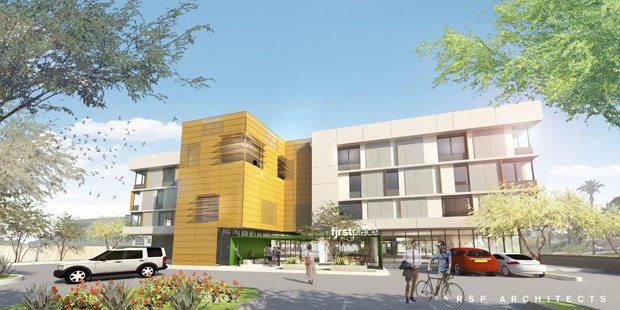Adults with autism have moved into the beta site for the First Place Transition Academy, one of three components of the future First Place mixed-use residential property in Phoenix. The Academy is teaching independent living, career development and social skills for a population that experiences a “services cliff” after high school, according to a new recently released national autism indicators report. First Place serves primarily young adults.
In April, residents moved into 29 Palms Apartments, a development of the Foundation for Senior Living, which co-locates six two-bedroom apartments for adults with autism and 15 affordable multi-generational housing units. Watch this video about First Place and the 29 Palms beta site.
“First Place is a home for my son to thrive and contribute to the broader community,” says parent, Bonnie Kluger. “First Place is supplementing the skills he already has to advance him on the road to independence.”
“We are thrilled resident students are moving in and experiencing independent living for the first time,” said Jeff Ross, First Place executive director. “Participants have completed a seven-week orientation and continue to learn skills from their independent living classrooms, also known as apartments. They’re also learning about community life that includes grocery shopping, navigating transportation, applying for a job and expanding their social networks.”
First Place and the Southwest Autism Research & Resource Center (SARRC) are collaborating on the two-year First Place Transition Academy, which teaches functional life skills from 29 Palms, provides paid work internships throughout the community and offers independent living courses on site and through SARRC’s Vocational & Life Skills Academy.
“The program aims to teach individuals the skills they need to live independently in their own homes as well as establish and maintain competitive employment,” says Paige Raetz Ph.D., Residential Transition Academy Director at SARRC.
Half of the new student participants have moved into 29 Palms. More prospective students are now being assessed and interviewed to determine if the Academy is a good match for their next step into adult life. Annual tuition, which covers rent, classes, individualized services and activities, is $42,000/year.
The new Academy participants will live at the beta site and have the option to live at the new First Place mixed-use residential development, expected to break ground in Phoenix early next year and open in early 2017. The property will be located at 3rd Street & Catalina, within walking distance to public transit and light rail. Envisioned as a replicable model offering an innovative approach to housing, First Place combines three complementary components: First Place Apartments (for residents), First Place Transition Academy (for students), and First Place Leadership Institute (a 10,000-square-foot facility for service providers, professionals and physicians).
The First Place Leadership Institute already includes a national faculty, advancing the continuing education and training of support service providers. Valerie Paradiz, Ph.D., the director of the Autistic Global Initiative, is serving as the curriculum specialist for the First Place Leadership Institute and member of its national faculty.
“As individuals with autism grow into young adulthood, we are embarking on a journey toward solutions. First Place is one of those solutions,” Paradiz said. “Our curriculum is finding positive, refreshing and thoughtful ways to help individuals with autism be more independent.”
Providing a local post-high school option is critical for adults with autism. New research from A.J. Drexel Autism Institute’s Life Course Outcomes Research Program details that youth entering adulthood experience a “services cliff” or a steep drop-off in services.
▪ Key findings of the National Autism Indicators Report: Transition into Young Adulthood include: Over one third (37 percent) of young adults with autism were disconnected during their early 20s, meaning they never got a job or continued education after high school. In comparison, less than 6 percent of young adults with other types of disabilities were disconnected.
▪ 74 percent of young adults on the autism spectrum have not attended postsecondary education, including 2-year and 4-year colleges, at some time between high school and their early 20s.
▪ Approximately one in four young adults with autism were socially isolated, meaning theynever saw or talked with friends and were never invited to social activities within the past year.
▪ Four out of five young adults on the autism spectrum never lived independently (away from parents without supervision) between high school and their early 20s.
Employment is often the primary transition goal of students with disabilities as they prepare to exit high school. The report indicates 58 percent of young adults on the autism spectrum worked for pay outside the home between high school and their early 20s—a rate far lower than young adults with other types of disabilities. Those who got jobs generally worked part-time for low wages.
According to Paul Shattuck, PhD, leader of the Life Course Outcomes Research Program and an associate professor at Drexel, and member of the First Place Leadership Institute faculty, “Over half of young adults work, and about one-third continue their education. Some do both. But one-third of all young adults with autism do neither. They are disconnected from the outcomes that special education was targeting.”
Refer to this Autism Indicators link for a complete copy of the report.
“A.J. Drexel Autism Institute’s new research report clearly defines the issues First Place and SARRC are addressing. Residential experiences combined with continuing education and real community experiences will help ensure more adults with autism enjoy the quality of life they desire and that parents like me dream about for our loved ones,” said Denise D. Resnik, First Place founder, board chair and president, and SARRC co-founder.




